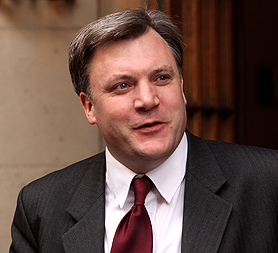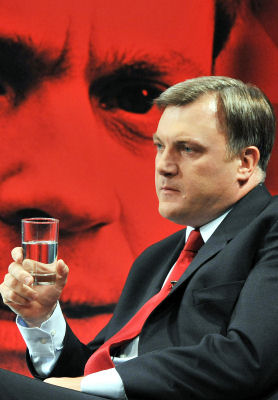Ed Balls: fighting to win Labour leadership
 Krishnan Guru-Murthy
Presenter
Krishnan Guru-Murthy
Presenter
Krishnan Guru-Murthy speaks to Ed Balls, who says the contest has been a “liberation” from which he has no intention of quitting.

Ed Balls is not giving up. Despite being joint favourite to come last in the Labour leadership contest, he believes he is gaining ground and benefiting from the long campaign.
He is also arguing for the most controversial economic policy: to slow down the reduction of the deficit to a pace below the one Labour argued for at the last election.
But he is surprising many with both a determination to oppose the coalition and with an ability to articulate a vision and conviction. Ed Balls is, however, suffering most from his closeness to Gordon Brown partly because Ed Miliband, who was almost as close, has carefully distanced himself as much as possible.
It has perhaps been one of the reasons so many centre-left figures in the party, and the big trade unions, have deserted Balls when they were once expected to back him.
Labour leadership: how a contest works
He is also fighting a characterisation of himself in the media as a bruising bully. That has been fed, he says, mainly by the right-wing media and the Tories.
But there is no doubt the past bust-ups with Tony Blair’s team have caused long term damage to the Balls image. For they are as responsible for the rumours as anyone.
Despite all this he is remarkably resilient in conversation – perhaps it was because he had just returned from his holiday driving the family around New England in the USA in a huge recreational vehicle (RV).
Vital statistics: Ed Balls
Age: 43
Constituency: Morley and Outwood
First elected: May 2005
Current role: Shadow education secretary
Nominations: 33 MPs, 17 constituency Labour parties, one trade union
Donations: £118,494 in June and July 2010 declared to the Electoral Commission.
Who Knows Who: Ed Balls' power map

“I don’t think people think of me other than as somebody who fights to win and sticks with it,” says Balls. “I started as the underdog. I started as somebody who if the poll had been very early on, in the first few weeks, I couldn’t have won.
“But it’s a liberation for me, this leadership election, to escape the shadows of the past and actually set out your own personal views about what needs to be done and the future.”
Standing up for voters
The shadow education secretary has no doubt about who his party needs to reach out to if they are to win back power – and it is not the middle classes.
“I think that the reason why we won in 1997 is that we managed to achieve an effective coalition of lower and middle income voters, who said they wanted a government that supported aspiration, but also believed in fairness and the need for public services,” he says.
“The problem is people on estates, private or social housing, maybe whose children hadn’t gone to university so far, who work hard, and who were saying that tuition fees make life very difficult for us, or who have difficulties with mortgages after the collapse of Northern Rock, or families who felt that they worked hard and saw other people in their area not pulling their weight.
Campaigning before the election in more than 40 marginal seats brought him up against people who did not feel Labour was “standing up” for them.
“I think this is something we can do, but it’s very important that we talk the language of those families in a very clear and direct way,” he said.
These families will, he said, be hit very hard by the withdrawal of tax credits and the rise in VAT, and hit hard by the coalition’s cuts.
Ten quick questions:
Where's your favourite holiday destination? A camper van in the United States.
What was your favourite subject at school? Very close one - probably history, but if I'm honest with you it was English literature.
What's your favourite drink? A really good bitter brewed in Norfolk - Woodforde's Wherry. It's the best pint of beer in the world.
What is your biggest fault? Spending too much time in the meeting I'm at, and being late for the next one. Who is your favourite member of the current coalition Cabinet? *Laughs* I'm not sure that's a question which has an answer.
If you hadn't been a politician what would you have been? I probably would have stayed in journalism but had a career change - a teacher or a headteacher.
Who is the adviser you most listen to? Of course Yvette (Cooper, his wife).
If you could choose any talent you currently don't have what would it be? Draw and sketch cartoons.
If Britain adopts AV which party will get your second preference vote? At the moment I wouldn't exercise my second preference.
Do you believe in God? I'm firmly in the Church of England tradition - it's perfectly acceptable to struggle with the answer to that question.
Balls rejects the suggestion that Labour’s failure to spell out how it would shore up the country’s finances lost it the election, saying that the David Cameron’s poll rating fell in the run-up to the election while the Conservatives attacked Labour on the economy.
“Labour needs to set out very clearly that there is an alternative, that the arguments being put by David Cameron and George Osborne are very reminiscent not just of Margaret Thatcher and Geoffrey Howe in 1980 but also Ramsay MacDonald and Philip Snowden in 1931,” he said.
“Labour needs to set out very clearly that there is an alternative.” Ed Balls
“Both times where following a financial crunch and a recession, governments cut public spending hard to try to get the deficit down and it resulted in public finances getting worse, unemployment being high for a long time.”
But if Balls loses the leadership election, doesn’t his insistence on such a softly-softly approach to deficit-cutting put him at odds with his rivals, and effectively rule him out of a second-prize job as shadow chancellor?
“One of the central questions of this few years is about how we deal with the deficit and whether we do so in a way that damages growth and jobs and our public services or supports them,” he said.
“I think that is a central question and that is why I’ve been very clear we have to set out an economic alternative.”
Briefings and bullying
The leadership hopeful says he isn’t afraid to take tough decisions or argue for what he believes in – even if it makes him unpopular. He cites his opposition to foundation hospitals and entry to the euro as an adviser to Gordon Brown at the Treasury during Labour’s first two terms. But away from policy issues, why does he think he has earned a personal reputation as a bit of a thuggish bully boy?
“First of all, it’s something that’s said regularly by the Conservatives and their friends in the newspapers who’ve always wanted to make sure my standing was undermined and I can understand why they tried to do that.
“In a way I’ve been tested on this compared to some of the other candidates in a very direct way – whatever they throw at me in terms of money, election campaigns or David Cameron’s visits, or personal attacks they don’t knock me down.”
Balls says he has been the subject of “many anonymous briefings” in the past year – a tactic he denies resorting to himself.
“I always have more respect for people when they do things on the record. I have never been somebody who has engaged at all in anonymous or off-the-record briefings about any politician. You’ve known me for a long time, many people in the lobby have known me for a long time, they know that’s not the kind of politics I engage in.

Second preferences?
The five-strong will make it tricky for any candidate to secure the 50 per cent of the vote needed to decide the contest on first preference votes alone. Second preference votes from Balls’ supporters could be decisive. So is he telling them which way to go?
He simply says it’s “very early days”, and deflects a question on whether he would prefer David to Ed Miliband on the basis that it would be easier for David to appoint Balls as chancellor, than fellow Brownite Ed.
“I think the important thing for any Labour leader to do, and I’ll certainly approach things in this way if I’m Labour leader, is I’ll always make sure that the best people are in the best jobs and the jobs they’re best suited to.
“Strength of character, strength of leadership is having the best people doing the jobs. Weakness in leadership is trying to make sure you only have less effective people who only do what they’re told and that’s not the approach I think any of the leadership candidates would take to these things.
Balls says he can’t just be a “not candidate”, attacking his rivals for distancing themselves from the past. “My pitch is if you want somebody who is really effective against the Conservatives and the Liberals but has also shown that they’ve got the campaigning skills and the strength of character to build teams, which is what you need to be an effective prime minister, then I’m the right person. I’m the person who can be the credible but also the radical leader of the opposition and prime minister.”